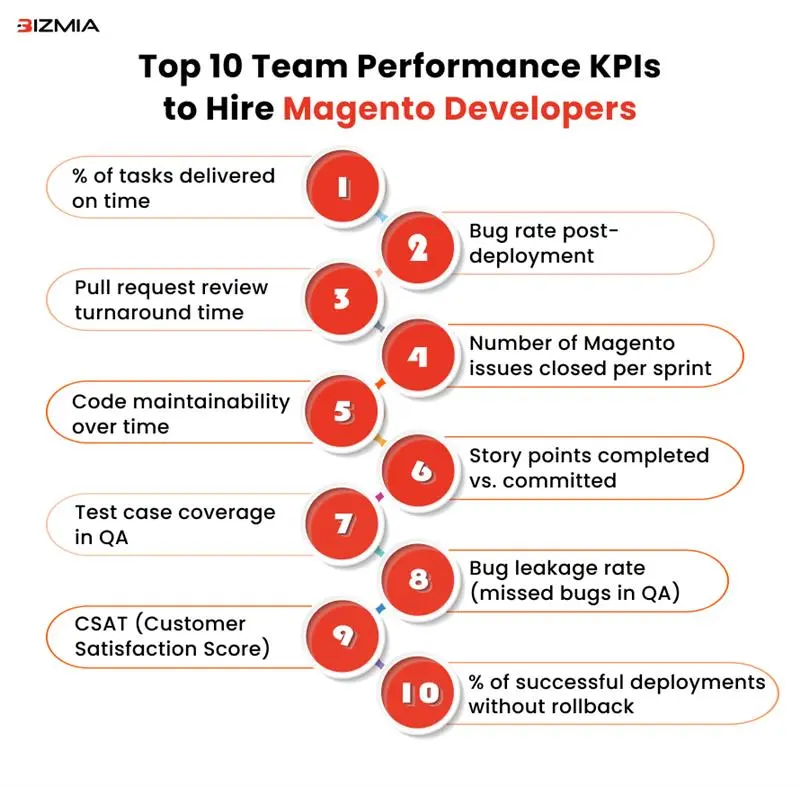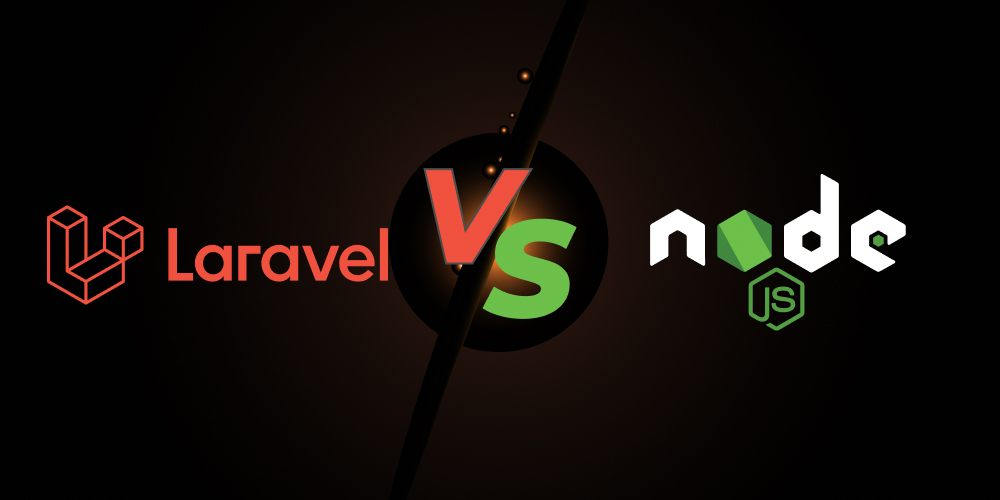When hiring Magento developers for web development or related tasks, there are certain key performance indicators that need to be observed and calculated. These KPIs help you understand the team performance and the progress for evaluation. In case you miss the certain team performance KPIs, there is a fair chance that you will not be able to evaluate the progress and understand in which direction the team is headed.
In this blog, we will discuss the top team performance KPIs you should consider when hiring Magento developers.
Without any further ado, let’s get started.
What are the top team performance KPIs You Should Look for?
The top team performance key performance indicators include project delivery timelines, code quality, metrics, task throughput and velocity, team collaboration and communication, QA efficiency, feedback and satisfaction.

Project Delivery Timeliness
Project Delivery Timeliness refers to the percentage of tasks completed and delivered on or before the agreed-upon deadlines.
Why It Matters in Magento:
In Magento projects, timely delivery is crucial for ensuring smoother go-lives and better client satisfaction. Delays can lead to cascading issues in marketing, sales, and operations, and might tarnish client relationships. When a Magento project is delivered on time, it boosts client confidence, reduces stress within teams, and often results in quicker revenue realization for clients. Furthermore, meeting deadlines reflects the efficiency and reliability of the team and its project management processes.
How to Track:
- Sprint Burndown Charts: These visual tools display the progress of a sprint by tracking the work completed versus the total work planned, allowing teams to see if they are on track to meet deadlines.
- Gantt Charts: A more traditional method, Gantt charts show the planned vs. actual timeline of project tasks, making it easy to identify delays and adjust schedules.
- Delivery Milestones: By setting clear project milestones, such as feature completions or integrations, you can evaluate how well the project is progressing and whether it’s meeting deadlines.
A successful Magento project will have a high percentage of milestones and tasks completed on or before their deadlines, ensuring that all elements—from product pages to checkout processes—are ready on time for a seamless go-live.
Code Quality & Review Metrics
Code quality in Magento projects refers to how clean, maintainable, and error-free the codebase is, along with the speed and effectiveness of the review process.
Why It Matters in Magento:
A high-quality Magento codebase ensures long-term stability, scalability, and performance. Magento projects are complex, often requiring integrations with external systems like payment gateways and CRM systems, making code reliability even more critical. Low-quality code can lead to bugs, security vulnerabilities, and performance issues, which negatively impact the user experience and, ultimately, client satisfaction.
Key Metrics to Track:
- Bug Rate Post-Deployment: Track the number of bugs or issues that arise after a feature is deployed. A low bug rate suggests that the development process is thorough and effective.
- Pull Request Review Turnaround Time: Measure how quickly pull requests are reviewed. Efficient code reviews contribute to better collaboration, faster bug fixes, and improved code quality.
- Critical Bugs Caught During QA: Keep track of the critical issues identified during the QA process. More bugs caught during testing means fewer critical issues making it to production.
By regularly tracking these metrics, teams can ensure that their Magento project codebase remains clean, maintainable, and free from critical issues, making future updates and scalability easier to manage.
Task Throughput & Velocity
Task throughput and velocity track the number of issues or tickets completed by the team in a given time period, typically measured in sprints.
Why It Matters in Magento:
Magento development is often a balancing act between bug fixes, feature development, and user stories. Task throughput measures how much work is getting done, while velocity tracks how efficiently the team is moving through their tasks. Together, these metrics provide a clear picture of team productivity and help assess whether the team is working within its capacity.
Key Metrics to Track:
- Number of Magento Issues/Tickets Closed Per Sprint: Track the total number of issues (bug fixes, enhancements, or tasks) completed in each sprint. This helps understand the team’s productivity.
- Story Points Completed vs. Committed: Story points represent the estimated effort required to complete a task. By tracking how many story points were completed versus what was committed, teams can evaluate the accuracy of their sprint planning.
By improving task throughput and velocity, teams can deliver more features faster, improving overall project efficiency and client satisfaction.
Team Collaboration & Communication
Team collaboration and communication focus on how well team members interact, share information, and resolve issues collaboratively.
Why It Matters in Magento:
Effective collaboration is the cornerstone of successful Magento projects. These projects are often multifaceted, involving backend development, frontend design, QA, and client-facing activities. Teams need to work together seamlessly to ensure that the project progresses without delays or misunderstandings. Poor communication can lead to missed deadlines, integration issues, and a disjointed user experience on the final product.
Key Metrics to Track:
- Frequency of Stand-Ups, Retrospectives, and Cross-Functional Meetings: Regular touchpoints help keep everyone aligned, ensuring that the project stays on track and that bottlenecks are addressed promptly.
- Internal Ticket Reassignment Rate: A high rate of ticket reassignments may indicate a communication breakdown or misalignment between team members regarding task ownership or understanding.
Fostering a collaborative environment in which teams feel comfortable communicating openly and resolving issues quickly will help ensure smoother project execution and higher quality outcomes.
QA Efficiency
QA Efficiency measures how effectively the testing phase of a Magento project identifies and resolves bugs, ensuring that the final product is stable and reliable.
Why It Matters in Magento:
Magento’s complexity, especially when it comes to integrating various third-party services, means that ensuring quality is critical to avoid user-facing bugs and operational issues. Poor QA efficiency leads to bugs being found too late in the process, often resulting in delays and costly post-deployment fixes.
Key Metrics to Track:
- Test Case Coverage: This metric tracks how much of the Magento codebase is covered by automated tests. The higher the coverage, the more thorough the testing, reducing the chances of bugs reaching production.
- Average Time Taken to Close QA Tickets: Measures the efficiency of the QA team in addressing and resolving issues. A low average time indicates a well-coordinated testing process.
- Bug Leakage Rate: Tracks the number of bugs that make it to production despite being missed during the QA phase. A high leakage rate indicates a need to improve the testing process.
By improving QA efficiency, teams can reduce the number of bugs and provide a more reliable, user-friendly Magento experience for clients.
Client Feedback & Satisfaction
Client Feedback and Satisfaction focuses on how happy clients are with the progress and outcome of the project.
Why It Matters in Magento:
Magento projects are often client-centric, with businesses depending on a fully functional and tailored online store to meet their goals. Regular feedback ensures the project is aligned with the client’s needs and expectations. High client satisfaction means repeat business, better referrals, and a stronger business reputation.
Key Metrics to Track:
- CSAT Scores Post-Sprint: Regular customer satisfaction surveys after each sprint help gauge how well the client’s expectations are being met.
- NPS After Major Milestones: The Net Promoter Score measures overall client satisfaction and the likelihood of recommending your team to others. It provides a clear view of how well the project is progressing from the client’s perspective.
- Feedback on Team Responsiveness & Quality: Collecting qualitative feedback on the team’s responsiveness and the quality of the work can uncover areas for improvement in communication or service delivery.
By staying on top of client satisfaction, Magento teams can ensure that they are delivering not only functional but also highly valued solutions.
Conclusion
The key performance indicators are the key to evaluate the success and progress of your project. When hiring Magento developers from a outsourcing company, make sure that you track all the KPIs of your team so that you can calculate the work and progress against each candidate.
Hire Magento Developers
If you want to scale your project seamlessly then hiring skilled Magento developers is the best key. At Bizmia, we provide skilled and expert Magento developers that you can hire within 48 hours. Our developers are tied to the KPIs that enable our clients to have a clear trac record of their progress and their performance.
Book a meeting today with us and scale seamlessly with us.
Frequently Asked Questions
Why is delivery timeliness an important KPI when hiring Magento developers?
Consistent, on-time delivery is a key indicator of a developer’s reliability and time management. At Bizmia, we prioritize developers who’ve demonstrated accountability in deadline-driven environments. Magento projects often follow tight go-live schedules, and delays can impact overall business operations. Evaluating a candidate’s past sprint delivery records, ability to estimate time accurately, and how they handle shifting priorities helps us ensure smoother delivery cycles for our clients.
How can I assess code quality during the hiring process?
At Bizmia, we evaluate candidates not just on the functionality of their Magento code but also on how clean, maintainable, and testable it is. Code review samples, pull request discussions, and post-deployment bug rates can reveal much about their habits. During hiring, we use code assessments and scenario-based questions to gauge how they handle edge cases, naming conventions, documentation, and team feedback, ensuring long-term scalability and maintainability of client projects.
How does Bizmia ensure top team performance when hiring Magento developers?
Bizmia ensures top team performance by integrating clear, measurable KPIs into both hiring and project execution. When we bring Magento developers on board, we assess not just technical skills but also how well candidates align with metrics like delivery timeliness, code quality, and collaboration. During projects, we continuously track performance using tools like sprint velocity charts, QA coverage, and client feedback loops.
This data-driven approach allows us to build high-performing teams that consistently deliver reliable, scalable Magento solutions—on time and to specification. It’s how we maintain our reputation as a trusted U.S.-based Magento development partner.












